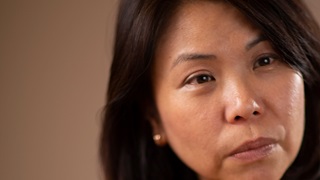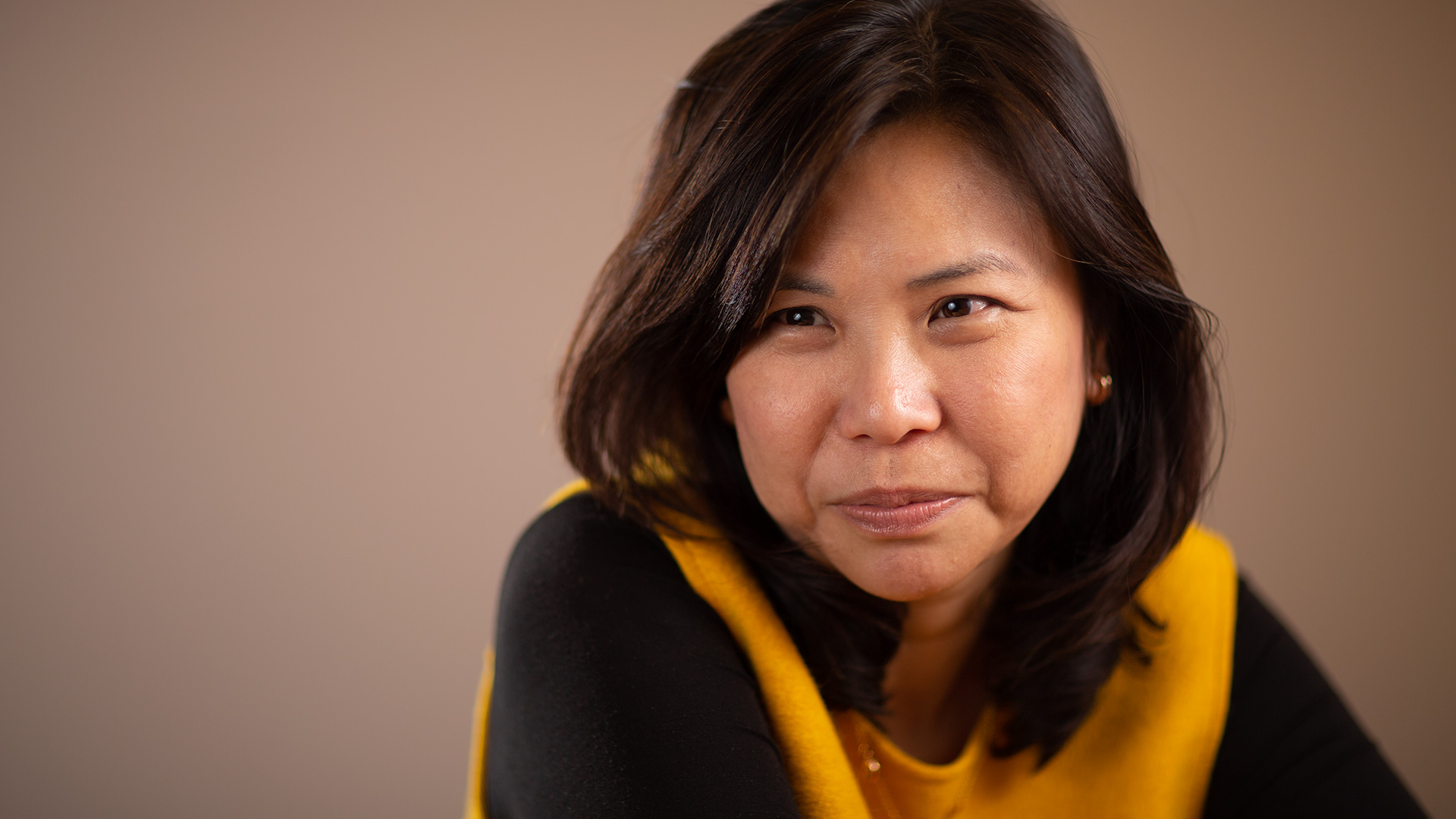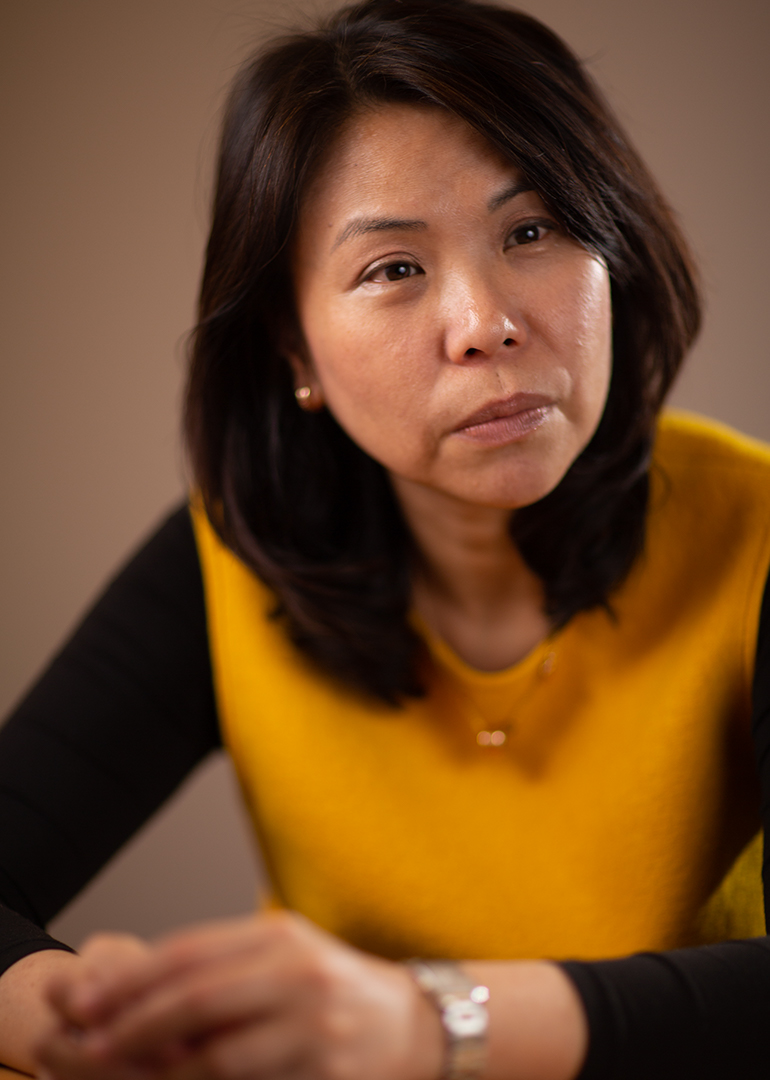
First person
Home to the spoken voice


Partner Psyche Tai in conversation with Ingeborg Alexander in February 2019
In Hong Kong, everyone has a Chinese name but most people also have a taken name, which we pick up when we go to school. My sister suggested my name, Psyche. It’s from a Greek myth.
My grandparents were born in mainland China. My grandma came from a wealthy family and she had a dad who was, I think, very open-minded. Her feet were unbound at the age of ten, because she was sent to school—this was very, very rare in those days, to go to school, and to take away the foot-binding.
The happy time didn’t last long; because of the war they all had to quit their studies.
She lost her brothers and sisters. They actually lost the whole family.
I never met my grandpa. He served in the army and probably got lost or died in the war. At that time in China this was not something new.
My grandma, my dad and my auntie came from Guangzhou to Hong Kong. They all walked. For days and days and months. They went down to Hong Kong to escape from the war. My father was just three or four years old when they walked to Hong Kong.
They walked down from their homeland because the Japanese had invaded China. Hong Kong was actually the last place to be conquered by the Japanese. At that time Hong Kong was under the charge of Britain.
They lost everything. My grandma had to start from scratch in Hong Kong.
I find that people who have experienced war look at things with a different set of values. They tend to bear more hardship, they complain less, just accept whatever happened, take the tragedy and move forward. I think this is a very good set of values.
Trauma happens to everyone in the course of their life. If we are given a chance to choose, probably it’s better to experience these bad days early. You become better at adapting, stronger, less vulnerable.
I think it’s not a bad thing if in your younger days you come from nothing; you gain determination, a clear view of life and the value of things. You gain some inner qualities. Of course, you might miss out on happy moments, having fun, going out with friends; if you live in poverty or in an environment that doesn’t allow you that luxury, then you won’t have those happy memories from your younger days. It can make you more serious, in a way. You don’t have those times of hanging around, doing nothing; you need to be focused, study, study, get high scores. At work, you need to be focused, to climb the ladder.

Photograph by Ivan Maslarov
I don’t have children. I would say that is—not a sadness, but a hole in your life; you cannot experience life from every aspect. I got divorced in my late thirties. I am single now. So I don’t have kids. If I were born in another time, I would probably want to experience that other life where I am not a career woman. Don’t misunderstand me, I love my job—but if I were given a second chance, then, yes, I would probably want to be a mum of two or three and learn more about myself through my kids.
My mum passed away at the time I got divorced.
My dad is still alive. He had a stroke, so he can’t speak well. Actually, I am still looking after him; he lives with me.
I am very lucky because I have siblings and we are very close, so we share our feelings.
I think I have to take some part of the blame for the divorce. I was probably too focused on my career. But life is life. I probably could have done things a bit better but I am not too unhappy with what has happened: I meet a lot of people through my work; if I had been a housewife, or a mum, needing to take care of family, I would probably have been deprived of those opportunities.
I know I can stand on my own two feet: that is a very great sense of achievement.
I was married for seven years. We were college schoolmates and were boyfriend and girlfriend for years before we got married. When you’re young, you’re still finding your way; we probably did not know much about ourselves at that time. And my early career required me to work around the clock. That is not very good for a relationship.
Everyone has their own story.
I have many friends who either got divorced or never fell into a relationship. I don’t know whether it’s good or bad, but people now, especially in the younger generation, don’t want to get married too hastily.
My mum is very Chinese. When I was little she practised Buddhism; then when I was ten she got cancer and she converted to Christianity. That’s when my whole family started going to church together. The Bible means a lot to me because I was brought up in that way. My religion has given me the will power and the faith to bear whatever situation I find myself in. I made a personal sign of faith at the age of sixteen and when I became an adult and was baptised again. All through my adolescence I was doing Bible study. Even now. It gives me the comfort, and the strength, to continue my life.
I’m still working really hard. Actually, I work everywhere. I sit in a shopping mall or in a garden on a conference call, for hours and hours. Yes, I have to say I work extremely hard. Time goes past and I don’t notice it, because I am enjoying myself working. It happens often.
In the early days, there were people older than I or more senior or more knowledgeable who held views which differed from mine; I found it easier, then, to step back from the argument. I think now, at my age, I would have more guts when it comes to expressing myself.
As a woman, of course you have to be on your guard. I am actually quite lucky. I am a Chinese woman, doing Chinese business, including occasions where there is drinking while the business is done, but I have not had many awkward encounters. Sometimes I wonder why that is. I think probably it’s because I look really serious, I am a lawyer, people generally are a bit afraid of me, I don’t know. I am always on guard, especially in how I talk, how I behave, I am always very much on guard as a professional.
With old friends you can be really open and say whatever you want. I enjoy that feeling. I have friends who are very like me, same high school, same university, also lawyers. And we have friends who are not so lucky; after high school, after university, they did not do as well in their careers, had to struggle a bit more in life; I think this is the time when they need people around them, friends. I think it’s important they have someone to speak to, to relate all the misgivings of their life.
I like hatha yoga: it gets rid of work stresses and makes my body less tired. When you meditate, your brain stops. Sometimes I concentrate my focus by praying to my God.
I practise qigong. It’s slow. You hold a posture, let the qi flow around the body. I sometimes let the qi lead me into different postures. I have been practising for years, every weekend. On holiday I practise every day, but if I’m working it’s difficult to get the time.
I was told that at my age hot yoga is too demanding. I like running, slowly. I can’t do it too fast, I ‘slow run’ and always outside, never on a treadmill. Being out in the sunshine and the green gives me energy.
I live in a high-rise apartment in Hong Kong, on the thirty-second floor. From my balcony I can see the water and Hong Kong Island. It makes me feel human and small. I get the feeling that I am small and my problems are also small.
At home I take a lot of pleasure in cooking. I don’t think I am particularly good at it but it takes me away for a while. I play music while I cook. Some of it is Hong Kong pop music, sentimental, full of emotion. Sometimes Chinese folk music or Chinese opera.
When I observe others performing well, I ask myself why I cannot and that motivates me to work harder, so at least I am not worse than others. My siblings are not like that. I think they have a more relaxed life.
I won’t describe myself as a perfectionist, but I am very demanding of myself; I always set myself high goals. I blame myself if I do not do well. At high school, if I didn’t do well in an examination, I would blame myself for a week at least. And in the workplace, if I felt I did not do that well in a meeting, it would keep me up at night, because in my mind I would be thinking how silly I was, what sort of thing I need to do; so, I am quite critical of myself; that is not good, I would say, not a good thing. My sister tells me not to be so serious with myself; she says sometimes you need to forgive yourself.
I think my parents don't impose anything on me; everything is self-imposed! They suffered when they were younger and they had no chance of higher education, so seeing their kids go to university is already wonderful for them. They did not expect me to become a professional, to be very successful—not to say they don't like it, but they did not expect me to work so hard to gain that. For them, as long as you are happy, you are healthy, that's all right; so I have very loving parents.
I am starting to think about my future because I am not that young, I am forty-nine. I need to learn to let go more. That is quite hard for me, because I tried to grasp everything when I was young but now it’s the other way round. I need to let the younger generation in.
I feel particularly comfortable at my age. Ten years ago or more, friends were getting married or having babies, but now people find themselves with more time. That’s why friends at my age are getting closer and spending time together. I think this is a really good thing.
My dad lives with me in my home. I enjoy the time with him. He’s in a wheelchair, but we are lucky because in Hong Kong we can have a domestic maid, so I have two taking care of my father. At the weekend I take him out, together with my sisters, for tea, or dinner. I really enjoy it, because he is now eighty-seven. I always try to take him to good restaurants; I tell my sisters that we don’t know how many times we can do this for him, so let’s be sure to give him some good food. Our family gatherings are always—just like all other families—all about eating, eating and eating. It’s probably the happiest thing to do for a human being.
Hong Kong is just a small space, really small; people tend to be born here, educated here, work here. We are all on this small island for the whole of our lives. I’m one of them. In Hong Kong everyone is running, not walking. It’s probably too small, too squeezed, but it is a lovely city.
Psyche Tai: head of Norton Rose Fulbright’s Hong Kong office; joined Norton Rose Fulbright in 2003; made partner in 2004; Law Society of Hong Kong, Company Law Committee member; Degrees from the University of Hong Kong; and Beijing University
© Norton Rose Fulbright LLP 2025